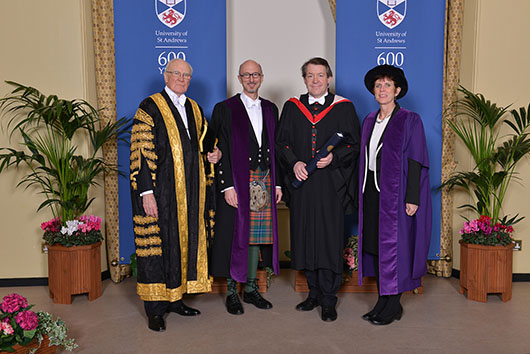Laureation address – Roger Gifford MA DSc (Hon)
Mr Roger Gifford MA DSc (Hon)
Honorary Degree of Doctor of Laws
Laureation by Professor Nic Beech
Vice-Principal (Governance, Policy & Planning)

Chancellor Sir Menzies Campbell, laureator Professor Nic Beech (Vice-Principal (Governance)), Mr Roger Gifford and Principal and Vice-Chancellor Professor Louise Richardson.
Chancellor, it is my privilege to present for the Degree of Doctor of Laws, honoris causa, Roger Gifford.
Alderman Roger Gifford, who has recently completed his term as the 685th Lord Mayor of London, was born and brought up in St Andrews. He has strong connections to the University and town, his father having been a professor of Spanish and founder of the University Renaissance Group here, and his mother having been a teacher at St Leonards.
Roger Gifford read Chemistry at Trinity College, Oxford, and went on to an outstanding career in banking. He joined the merchant bank Warburgs in the 1970s and in 1982 he went to a new venture owned by the Swedish Skandinaviska Enskilda Banken (SEB). For six years he headed the bank’s operations in Japan, subsequently was Head of SEB UK and he has been Chairman of the Association of Foreign Banks for several years. He has gone on to occupy many senior roles in the City and has used his influence in those positions to promote values which are also central to the purpose of St Andrews.
His approach to banking has been to emphasise service in financial services and to argue for a stronger moral dimension to leadership and practice – a call which resonates with the ethical banking research focus in the School of Management here. Clearly, banking has been going through a period of major disruption and change, and the direction of change would appear to be in line with the approach Roger Gifford has long-since adopted of the Swedish bank where he has worked for 30 years. Acknowledging that we cannot generalise to the entire industry from a subsection of it, Gifford argues that it is necessary to live by the highest standards and to have the humility to ‘recognise that parts of the banking industry have to re-emphasise their relationship with society’ in the way that Nordic banking did many years ago. SEB has operated as ‘an adjunct
to industrial Sweden, rather than a bank that is doing its own thing for its own sake’. He believes there is a great need for banks both to serve society and to be seen to do so: ‘we need a more moral approach to capitalism’ which includes a willingness to be self-critical and open about the fallibilities of the system. This way of thinking is reflected in the reaction to the Occupy protest movement which camped outside St Paul’s. Rather than dismissing them, Gifford saw it as useful to the extent that it gave a ‘fillip to the discussion’ about the ‘purpose of money and the economy’.
His voluntary and philanthropic work perhaps reflects his St Andrews background and his interests in music and education. He is a Trustee of St Paul’s Cathedral Foundation, St Paul’s Cathedral Choir School Foundation, King Edward’s School Witley, the Mansion House Scholarship Scheme and the Mayor of London’s Fund for Young Musicians. He is also a proud GlobalScot for Scottish Enterprise. He chairs the English Chamber Orchestra charity among other arts involvements. His appeal for the City Music Foundation is illustrative of an ethos which resonates with St Andrews. This foundation funds performance opportunities for talented musicians from all walks of life – ‘supporting social mobility, building ambition and encouraging the pursuit of artistic excellence’. Hence, there is a focus on top quality outcomes combined with a clear rejection of socially elitist practices of access.
In addition, Roger Gifford has brought a spirit of dialogue and enquiry to his leadership. In St Andrews, dialogue within disciplinary communities and across academic boundaries is fostered both in our degrees and in our research institutes. It is often by daring to step over the boundaries of relative certainty or confidence that new insights and challenging questions are encountered. As John Shotter has argued, dialogue may be most significant when it changes not the other but, rather, the self. Speaking in the context of a recent interfaith meeting, Roger Gifford argued for: ‘making a virtue of a spirit of enquiry and the value of asking questions – a recognition that our knowledge is partial, a recognition of the deep experience of other faiths, and a continuing quest for a greater knowledge of ourselves’.
He is a member of the Worshipful Company of Musicians, Past Master (2010–2011) of the Worshipful Company of International Bankers and served as a Sheriff of the City of London. Roger Gifford has received many honours, amongst them being made a: Freeman and Liveryman of the City of London; Knight of the Most Venerable Order of St John (KJStJ); Commander of the Order of the Polar Star (Sweden) and Commander of the Order of the Lion of Finland.
Speaking at the time of the Lord Mayor’s Show last year, in which the University of St Andrews played a prominent part, he said: ‘St Andrews holds a very special place in my heart. I grew up on North Street and the Scores, spending my formative years on the beaches and braes of this most wonderful town. My father spent his entire teaching career in the service of Scotland’s oldest and finest university, and I still call St Andrews my home.’
We are delighted today to be able to say welcome home in what we hope is a special way. Therefore, Chancellor, in recognition of his major contribution to banking, the public service of the City, educational and musical charities, I invite you to confer on Roger Gifford the Degree of Doctor of Laws, honoris causa.
Category Awards